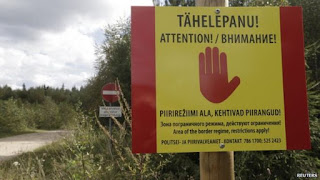
Estonia’s Proposed Border Improvements Could Derail Estonia-Russia Border Agreement
By:
Last week, on the sidelines of the 70th annual session of the United Nations General Assembly, Russian Foreign Minister Sergei Lavrov met with his Estonian counterpart, Marina Kaljurand, at her request. Among other topics, the two discussed the outlook for Russia and Estonia reaching a political settlement on a border dispute that has persisted since the collapse of the Soviet Union. Unlike Latvia and Lithuania, Estonia has, thus far, been unable to settle an official border agreement with Russia since gaining its independence in 1991.
During their meeting, Kaljurand told Lavrov that the Estonian Parliament is prepared to review and ratify an agreement officially recognizing the borders that has de factobeen used since Estonian independence. Lavrov, in turn, said that the Russian State Duma is prepared to consider the agreement for ratification (Postimees.ee, September 28). The resolution of this border dispute would no doubt be welcomed by Estonians, who, like the citizens of many of Russia’s neighboring states, have been anxious about preserving their territorial integrity since Russia’s annexation of Crimea in 2014 (see Jamestownfoundation.blogspot.com, February 26).
However, what are the chances that this dispute will be resolved in the near future? While Estonia may be keen on formalizing its borders with Russia vis-à-vis a bilateral agreement, Estonia’s other efforts to secure its borders could actually serve as an excuse for Moscow to stymie this process.
In late August, Estonia announced a plan to completely seal off its land border with Russia using fencing, high-tech surveillance systems and aerial drones (Kommersant, September 1). This project, estimated to cost €71 million ($80 million) and set to begin construction in 2018 (Vz.ru, August 25), has largely been interpreted as a response to the fear of Russian incursions into Estonian territory. Estonians’ territorial insecurities were accentuated last year by the highly publicized case of Estonian security officer Eston Kohver. According to Estonian officials, the Russian Federal Security Service (FSB) abducted Kohver on September 5, 2014, while on Estonian territory, and imprisoned him in Russia on false charges. Kohver was convicted of espionage in early September 2015, and Estonian officials were able to secure his return home in a spy swap with the Russians by the end of the month.
Russian officials have been vocal in their responses to Estonia’s announced border strengthening plan. The Russian Ministry of Foreign Affairs released a statement labeling Estonia’s plan as “politicized” and declared that unilateral action to enforce the border between Estonia and Russia is legally unfounded, as Russia and Estonia have yet to ratify an agreement defining their shared border (Kommersant, September 1). Meanwhile, Irina Yarovaya, Chairman of the Russian State Duma Committee for Security and Anti-Corruption, has mocked the plan, stating that it looked as though Estonia was trying to build an “Indian reservation” for its citizens (Gazeta.ru, August 25).
Of most concern, however, are comments by Alexei Pushkov, the head of the State Duma Committee on International Affairs. Pushkov claimed that poor bilateral relations with Estonia, undoubtedly shaken by Estonia’s announced plan to fence off its border with Russia, promise to slow the Russian ratification process of any border agreement (Vz.ru, September 1). In an effort to quell the Russian reaction, Estonian Foreign Minister Marina Kaljurand gave a statement emphasizing that the Estonian government is only discussing possible future options for securing its border (Kommersant, September 6).
The effectiveness of Estonian efforts to assuage Russian officials’ stated anxiety about Estonia’s proposed border security plan will be seen when the Russian Duma formally discusses the ratification of the proposed border agreement. Although Foreign Minister Lavrov indicated that the Duma is prepared do discuss and ratify the agreement, Pushkov’s statements raise doubts concerning the likelihood of this happening.
Beyond poor bilateral relations, it is conceivable that Russian officials may not view ratifying a border agreement with Estonia as in their strategic interest. Estonia is not the only EU member state with concerns about its border with Russia. Latvian officials have echoed their Estonian neighbors, saying that Latvia may also need to consider erecting a fence along its shared border with Russia (Baltic Course, August 28); and Finland’s Defense Minister Jussi Niinistö has publicly considered laying new landmines along the Finnish-Russian frontier (EER, September 3).
Whether or not these statements result in concrete actions, they are obviously an expression of the tense security situation across the region. Meanwhile, judging by their vocal criticism, Russian officials may fear that Russia will be unable to easily defeat these increased security measures taken by all of the countries on its border. Therefore it is entirely probable that Moscow will view not ratifying a border agreement with Estonia as strategically advantageous: giving it the grounds to further oppose Estonian border reinforcements and maintaining a legal gray area in which Russia prefers to operate.




